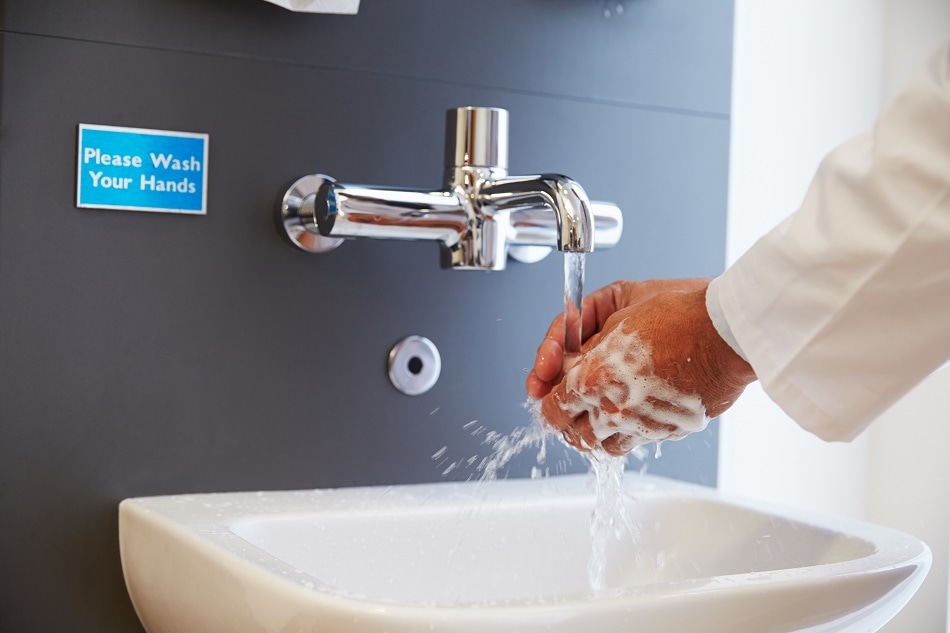
Image credits: Monkey Business Images/shutterstock.com
Preventing the spread of infectious disease is high on the agenda of hospitals around the world. One of the most effective ways to mitigate against the outbreak of disease is good hand hygiene in accordance with World Health Organisation (WHO) guidelines.
Back in 2017, Franklin Woods Community Hospital in Johnson City, Tennessee, installed small sensors in each of its inpatient rooms to track the hand hygiene of employees.
Since then, their parent company Ballard Health has been rolling out the sensors across their facilities with three hospitals taking on the system and two more to follow in the coming months. Jamie Swift, corporate director of infection prevention at Ballad Health says, “It’s the backbone of infection prevention.”
The nature of infectious diseases means that there is a wide range of factors that contribute to their spreading. These range from systems and processes of care provision as well as human behaviors often influenced by the conditions of education, economy, and politics. Yet, most outbreaks are preventable and good hand hygiene is a primary method of further reducing the risk and spread of infection.
It is also believed that health-care facilities that commit to improving hand hygiene seem more open to developing other strategies for other infection control practices to prevent a rise in hospital-acquired infections (HAIs). Therefore, taking the measure to improve hand hygiene provides a boost to patient safety across an entire organization. This is exactly what Ballard Health is aiming to do in their rollout of the system developed by technology startup SwipeSense.
HAIs cause much suffering and distress for many patients but also place an extra financial burden on health-care facilities which can cost tens of thousands of dollars per infection. According to a 2013 study, published in Jama Internal Medicine, the total annual cost of the five major and most common HAIs was in excess of 9.8 billion USD. SwipeSense state, “Hospitals lower their costs and reduce preventable harm with our intelligent sensors and actionable insights.”
When Ballard Health went about implementing the SwipeSense system into their facilities, Swift stated that they wanted to find “fun initiatives” to encourage staff members to welcome the sensors into the workplace and not feel under pressure. Therefore, by using the data collected, the units with the most improved stats and best compliance were rewarded with pizza parties etc. “The first year after installing the system, Franklin Woods reported only one infection,” added Swift.
What’s more is that the numbers were up on instances of facility monitoring regarding hand hygiene and whether or not someone had indeed washed their hands. Previously, relying on staff members and “secret-shoppers” to record such information, around 200 occurrences of proper hand hygiene were record per month in Ballard Health facilities. Once the SwipeSense system had been installed those facilities with the sensors recorded over 100,000 instances per month.
However, the data is only useful and serves a purpose if it is also being used in the right way.
It isn’t as simple as the solution or best practice that we implement here is now going to work elsewhere … You have to take the time to really understand it, because it is more complex than just reminding someone to wash their hands.
Klaus Nether, Executive Director, The Joint Commission Centre for Transforming Healthcare
This is why Ballard Health uses the system to open up a dialogue with individuals or units that are missing targets. They found that some of the reasons why staff members may not be inclined to wash their hands may be down to a simple case of there being a lack of alcohol gel in a room or a case of a staff member’s hands being full when they move between rooms. Solutions can then be found in order to ensure standards are raised and help prevent HAIs.
Furthermore, recently the English Institute of Sport recommended that British Olympians use SureWash, an online training platform used by the NHS, to coach good hand hygiene. It was reported that over 5,800 days of training are lost each year due to the spread of respiratory illnesses due to poor hand hygiene. Due to the extensive travel and intensity of an athlete’s schedule, preventing the spread of disease is not just paramount to an athlete’s marginal gain but also to prevent an outbreak amongst a community gathered in an Olympic Village.
It is clear to see how the concept of good hand hygiene is an important factor across the board; whether that be a health-care facility wishing to decrease the number of HAIs recorded; an Olympic Team wishing to improve the well-being of its athletes and surrounding environment, or for those of us in everyday life finding ways to prevent the spread of infection and disease is key to maintain a healthy society. For the employees of Franklin Woods Community Hospital and Ballard Health that comes with the application of sensor technology and with that improved patient safety and the prevention of additional expenses.
Disclaimer: The views expressed here are those of the author expressed in their private capacity and do not necessarily represent the views of AZoM.com Limited T/A AZoNetwork the owner and operator of this website. This disclaimer forms part of the Terms and conditions of use of this website.